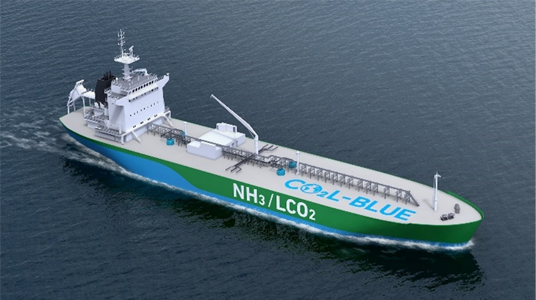Press Release
Title:
ClassNK issues approval in principle (AiP) for Ammonia and Liquefied CO2 Carrier developed by Mitsubishi Shipbuilding and NYK Line
29 June 2023
Tokyo - ClassNK has issued an Approval in Principle (AiP) for an ammonia and liquefied CO2 (LCO2) carrier which has been jointly developed by Mitsubishi Shipbuilding Co., Ltd. and Nippon Yusen Kabushiki Kaisha (NYK Line).
Ammonia is projected to be widely used as a source of clean energy for decarbonization since it does not emit CO2 when combusted, and is expected to be increasingly transported by sea. On the other hand, efforts toward carbon dioxide capture, utilization, and storage (CCUS), a process that captures emitted CO2 and either uses it as a resource or stores it in a stable underground geological formation, are also progressing. The necessity of LCO2 carriers has been highlighted for the efficient transport of captured CO2 to facilities for utilization and storage sites.
The ammonia and LCO2 carrier developed by Mitsubishi Shipbuilding and NYK Line is designed to carry both ammonia and LCO2 safely and economically using the same carrier. The carrier enables operations such as transporting ammonia to thermal power plants on the outbound route and transporting CO2 emitted from thermal power plants to storage sites on the return route.
ClassNK carried out the design review of the ammonia and LCO2 carrier based on its Part N of Rules for the Survey and Construction of Steel Ships incorporating the IGC Code. Upon confirming it complies with the prescribed requirements, ClassNK issued the AiP.
ClassNK will continue to make contributions to advanced initiatives toward decarbonization, including safety assessments.
Image of an ammonia and LCO2 carrier (Courtesy of Mitsubishi Shipbuilding and NYK Line)

Approval in Principle (AiP):
At the initial stage of designing or before the specific target ship to be implemented is decided, the design is examined based on the existing regulations such as international conventions and ship classification rules, and an Approval in Principle (AiP) is issued as proof of conformity with requirements. It also prevents rework of regulatory aspects in the post-process, shortens the examination time at the time of class registration, and can be used as a technical basis for external appeal of the design status.
Close